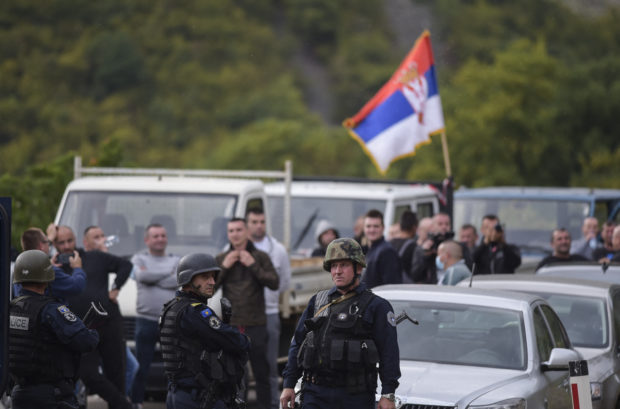Serbian troops on heightened alert at Kosovo border

Kosovo police special unit secure the area near the Jarinje border crossing on September 20, 2021. AFP
BELGRADE — Serbian troops were on a heightened state of alert on Sunday after the government in Belgrade accused neighboring Kosovo of “provocations” by sending special police units to the border.
Already tense relations between Serbia and its former breakaway region have grown worse since the ethnic Albanian-led government there on Monday despatched the police units to an area mainly populated by minority ethnic Serbs, who reject the authority of the government in Kosovo’s capital Pristina.
The deployment came as hundreds of ethnic Serbs have staged daily protests against a decision to require drivers with Serbian registration plates to put on temporary ones when entering Kosovo — a “reciprocal measure”, according to Pristina.
“No one here wants a conflict and I hope there won’t be one,” said a 45-year-old protester who identified himself as Ljubo and was camped at the Jarinje border crossing.
“We want Pristina to withdraw its forces and cancel the decision on license plates.”
Article continues after this advertisementHundreds of Serbs in Kosovo have been protesting and blocking traffic with trucks on the roads leading to two border crossings.
Article continues after this advertisement“After the provocations by the (special police) units… Serbian President Aleksandar Vucic gave the order to heighten the alert for some Serbian army and police units,” the defense ministry in Belgrade said in a statement.
Serbian fighter jets could again be seen overflying the border region on Sunday after several sorties on Saturday, an AFP correspondent reported.
Diplomatic pressure
The European Union’s chief diplomat Josep Borrell urged Serbia and Kosovo to reduce tensions “by immediately withdrawing special police units and dismantling of roadblocks”.
“Any further provocations or unilateral and uncoordinated actions are unacceptable,” he said in a statement.
NATO Secretary-General Jens Stoltenberg said he had spoken by phone to the Serbian president and Kosovar Prime Minister Albin Kurti.
“It’s vital both Belgrade and Pristina show restraint and return to dialogue”, he tweeted.
NATO troops have been deployed in Kosovo since the 1998-99 Serbian-Kosovar conflict.
Belgrade does not recognize Kosovo’s unilateral declaration of independence in 2008 and sees Pristina’s decision on the license plates as implying its status as a sovereign state.
The Serbian head of state, Aleksandar Vucic, deplored the lack of reaction from the international community to “the total occupation for more than a week of northern Kosovo by Pristina’s armored vehicles”.
“And everyone is suddenly worried when Serbian helicopters and planes are seen over central Serbia,” Vucic said in a statement, adding, however, that Serbia “will always behave responsibly and seriously”.
Kosovar Prime Minister Albin Kurti on Saturday accused Serbia of wanting to “provoke a serious international conflict”.
Early on Sunday, Serbian Defense Minister Nebojsa Stefanovic visited troops at two military bases where they are on alert, including one that is just a few kilometers (miles) from the border.
Belgrade designates border crossings between Serbia and Kosovo as “administrative”.
Serbian ally Russia also does not recognize Kosovo’s independence, but most Western countries do, including the United States.
For its part, NATO member Albania, “concerned by the escalation of the situation”, has asked Belgrade “to withdraw the armed forces deployed on the border with Kosovo”.
Kosovo President Vjosa Osmani cut short a visit to New York for the UN general assembly “because of developments in the north of the country”, her cabinet said.
Kosovo’s declaration of independence came a decade after a war between ethnic Albanian guerrillas and Serbian forces that claimed 13,000 lives, mostly ethnic Albanians.
The United States and the European Union have called for a de-escalation of tensions and for the two sides to return to normalization talks, which the EU has mediated for about a decade.
The Serbian president said the normalization process can resume only if Kosovo withdraws the special police forces from the north.